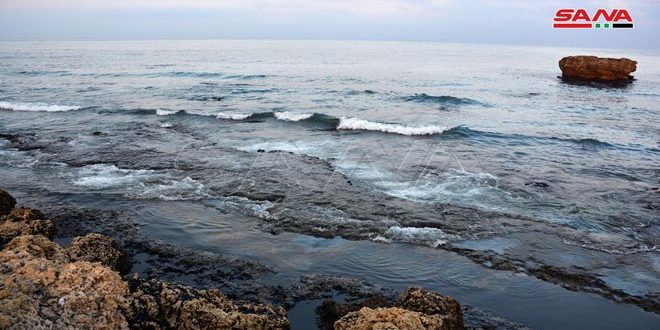The Marine Research Institute in Lattakia.. Successful studies and experiments to remove oil pollution from beaches
The Higher Institute for Marine Research in Lattakia has carried out many successful researches and experiments using marine biotechnology, which it has been working on for years to remove oil pollution from marine waters leaking from the thermal station in Banias.
Dr. Samer Ghadeer Ameed said in a statement to SANA that the results of the experiments were outstanding, and the treatment rate exceeded 95 percent, with the aim of protecting and restoring the ecological system.
He added that the institute has prepared a plan to remove the resulting pollution.This plan includes several stages,and it will be in cooperation with the General Authority for Fisheries, through evaluating the environmental reality after treating the oil slick from the first stage.This will happen by collecting samples from the polluted area (water, sediment and marine life) and analyzing them to assess the environmental situation of the area .
Dr. Ameed clarified ‘ After the oil spill accident, marine biotechnology will be applied to treat oil residues in water, in addition to a final evaluation after the bilateral treatment process, by collecting and analyzing samples from the contaminated area’.
Dr. Samer indicated that there are several stages to treat the oil slick, as the first stage includes treating the oil slick, which needs materials and equipment, and this stage is entrusted to the Ports Directorate, as it has the necessary staff and equipment. The treatment techniques are divided into four main groups, which are chemical treatment using chemical dispersants, and there is also heat treatment by burning the floating oil on the surface of the water and biological treatment by adding nutrients that enhance the ability of bacteria to dismantle oil in addition to mechanical treatment, which is recommended as it removes oil from the marine environment and avoids the damages caused by chemical and thermal treatment.
Dr. Samer pointed to the negative effects of the oil slick on marine life and the living organisms interacting with it, as well as on humans.
The technical teams intensified their efforts to complete the process of cleaning Jableh beach from the fuel leaked from Banias station.The General Directorate of Ports indicated in a press statement yesterday that the current accident led to the fuel leakage and its reached the sea, most of the fuel settled on rocky shores or shallow waters in the Banias and Jableh areas, noting that, with the concerted efforts of the concerned authorities specified in the national emergency plan, the dissipators and barriers that are deployed from the land are used to remove the oil pollution.
Sanaa Hasan

